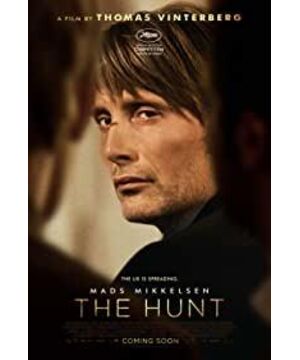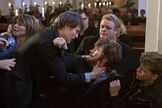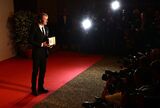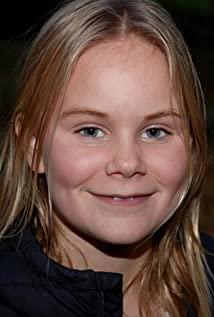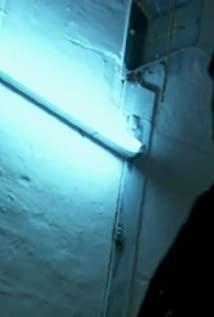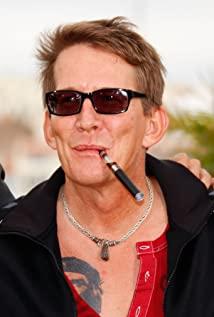Recently, in the prevention and control of the coronavirus, there has been a phenomenon of "fear of Hubei", and people who are suspected of being infected, such as the population from Wuhan, where the epidemic is severe, are treated with special attention.
I just read a couple of sentences from the Italian thinker Giorgio Agamben, and borrowed his theory to set a film "Hunting" to talk about isolation.
The inspiration for this movie is said to come from the modern "Witch Hunt" story that director Thomas Winterberg got from the psychiatrist's dossier.
And the beauty of this film is that it combines this "quiet sin" story with hunting.
Denmark, a model room of modern democracy, has become a black fable in the film.
Whether it’s hunting, hospitals, or isolation systems, Agamben calls them all devices:
...Anything that captures, dominates, determines, interferes with, shapes, controls, or fixes the posture, behavior, opinions, and words of a living being. Thus, it includes not only prisons, lunatic asylums, panoramic vision systems, schools, confessions, factories, disciplines, justice, etc. (their relationship with power is self-evident in a sense), but also pen, writing, literature, etc. Philosophy, agriculture, cigarettes, navigation devices, computers, mobile phones and language itself... "What is a device? "("What Is an Apparatus?" and Other Essays)
Modern hunting is no longer just for carnivorous fur.
Hunting is a device that separates animal life or natural life (zoe) from human life (bios) in the forest, helping to establish a higher level of human life than animals.
In this way, humans can expropriation animal life in hunting to confirm their own strength.
According to Roland Barthes' "Rhetoric of Mythology", eating bloodshot steak raw gives people the illusion of bull-like strength.
Similarly, people eat venison, wear deer skins, and hang deer heads not only for practical purposes, but also to draw the speed and vitality of deer from it.
At the same time, it is precisely because people kill in groups and trust each other not to "injury friendly forces by accident," that the human community has been achieved.
However, the paradox is:
In the current stage of capitalism, what defines the device is not so much the production of the subject, as it is the process of desubjectivization. "What is a device? "("What Is an Apparatus?" and Other Essays)
No matter how strong the desire to kill and how innovative it is to kill, the hunter has not acquired a new subjectivity, but seems to have become the "oil" burned by this device.
Take the movie as an example.
In the beginning, the male protagonist Lucas was "qualified" for hunting.
But he went hunting in groups, just like his clothes diving into the water and fishing people, and he couldn't withstand the persuasion of alcohol. It was just the prescribed actions of men's masculinity games and drinking devices.
The purpose of de-subjecting these devices is to form a community of Nordic towns in the film.
In the opening scene of the film, he accompanies the children to hide and seek, wipes the buttocks of the boys who have gone to the toilet, is "attacked to death" by the boys in the game, and accepts the love of his girlfriend who is waiting for the rabbit. All show that he is a good old man who is responsive and passive. ——In other words, willing to hide the self in the community.
But Lucas did not expect that when he pulled the trigger on a deer, he himself entered a "hunting" scope——
Once he was wronged, his guns were pointed at him quickly, and even his qualifications for being a person/hunting had to be revoked.
And it is precisely because hunting separates human life (bios) from the animal life or natural life (zoe) of deer that Lucas is isolated by the human community—abandonment, and reduced to an exception to “human rights”— -The rat crossing the street that everyone shouts and beats, which is what Agamben calls barelife.
The most chilling thing is not the mob of French sociologist Gustva Le Bon (Gustva Le Bon), or the indifference of most people to the truth.
It's that almost everyone, whenever they have a chance, intentionally or unintentionally slaps an innocent and good old man like Lucas;
It was not the victims who hurt Lucas the most, but other people who had no interest.
Even the children who had been mingling with Lucas turned one after another and made confessions against Lucas.
However, it must be noted that this is not the so-called "natural evil".
Take the initiator of the rumors—the little girl Clara. She lacks the love of the family, so she transfers her feelings to Lucas, who cares for him very carefully. She sees her father in the dark, but her mouth is called Lu. Cass.
But when she showed her love to Lucas but was frustrated one after another, her damaged self-esteem turned into a father-killing aggressiveness.
But after realizing this mistake, she repeatedly admitted to lying and greeted Lucas.
What's interesting is that she never dared to take a step beyond Lei Chi-walked to the plaid patterned floor.
This shows that, as the avant-garde artists believed, she was evoked with an egalitarian attitude in a simplified and geometric environment like the accomodate grid pattern.
Other ignorant children gave consistent confessions under questioning by adults, which was obviously a conformity mentality.
So, what caused this "tyranny of the majority" phenomenon?
Agamben’s answer is the "original structure" of the community:
What is exclusion from the community is the cornerstone of the life of the community as a whole. "Holy Man: Supreme Power and Naked Life"
Agamben explained: Community, in fact, has no roots——
All social actions of human beings can only be based on other actions, there is no cornerstone or heaven flying from beyond.
And this "other action" as the cornerstone is the violent exclusion of someone or something.
It is precisely this exceptional state of exclusion that establishes the "universal" state of law.
The rejection of Lucas in the film is spatial:
Forbidden to enter the special space-the kindergarten where he works;
"Get out of my house" and be kicked out of other people's private residences such as children, friends' homes and supermarkets;
And at Christmas, when Lucas came to the church, the public space that claimed to be the only one to accept everyone, including "sinners" like him, was in the same room, and everyone was fidgeting.
He can only return to the family and live with his son Marcus.
The protection of private property, including private houses, has always been promoted as the foundation of capitalism (rule of law).
But people still didn't let him go-harassed him and smashed his windows.
Second, rejection is also physical:
To drive Lucas out of the supermarket, but also to face each other;
Even his dog must be killed.
As a domestic animal, dogs have a special status among animals.
On the one hand, the protagonist’s pet dog in Hollywood movies has the qualities of a baby, symbolizing bravery and loyalty, and at the same time has the ability to be the protagonist’s assistant, so it is almost immortal.
On the other hand, as a "faithful servant" of mankind, the family dog has at least partially converted to the human community. Not only is it human property, but it is also physically connected with humanity.
Once bad luck strikes, dogs are often the first to suffer, which is a prelude to the bad luck of the dog owner. For example, a serial killer must poison the dog before entering the house.
And there is a saying, "It depends on the owner to beat a dog." For example, the carnage caused by the death of the vicious dog in the movie "Eden Lake" (Eden Lake).
It is in this sense that Agamben is amazing:
Today, the fundamental biopolitical paradigm in the West is not cities, but concentration camps.
"Remnants of Auschwitz" (Remnants of Auschwitz)
This small western democratic town where Lucas is located is no different from a concentration camp—
It's just that he and his son are the only ones in custody.
When Lucas stayed at home in the middle of the night, he lit a candle to illuminate the hunting picture hanging on the wall of the house, seeming to grope for the answer in the darkness.
What he wants, is the sense of belonging in the hunting map? Or the majestic glory of the ancestors?
When admiring this painting before, he might not have realized the violence behind the hunt.
The two major scenes in the film, the forest and the small town, correspond to the structure of the community:
The gloomy forest is an exceptional "extra-legal" place, where people can legally raise a gun and slaughter;
Small towns are city-states that apply the "universal" method, and it seems that there is no room for guns...until it is necessary to reject them;
Only with the forest can there be a small town;
The small town seems to be a civilized world under the jurisdiction of the law, but in fact, it may become a "forest" at any time.
At the end of the film, in a sacred ceremony, Marcus obtained a hunting license.
Lucas also gifted him a shotgun he inherited from his family, and reunited with a group of adult men.
This not only gave Marcus the right to "kill", it was also his coming-of-age ceremony, symbolizing his joining the community.
Lucas seemed to have lost his injustice and became a member of "us" again.
However, the story is far from over.
Afterwards, Lucas and his son went hunting in the woods, trying to re-enter the life order of people killing deer, and a stern shot was placed beside them.
This shot shattered the quiet fantasy of the years, and it was chilling to the bones.
In the backlight, the person who fired the gun couldn't see clearly.
The sun at sunset only embeds a human-shaped gold rim, which looks tall and mighty——
This finishing touch has sublimated the social realism of the film into a dark political fable, which is similar to the scene at the end of "Memories of Murder":
Anyone can be a murderer.
This shot may be an attack or a warning:
As the so-called "homo sacer" (Agam native language) rejected by the community, Lucas is an unsuspecting living target that can be controlled by his opponent, the sovereign, in an exceptional state at any time.
For the holy man, anyone can become the sovereign;
As for the sovereign, anyone is a potential sacred person.
At the beginning of the movie, when Lucas aimed at the reindeer, the deer turned his head and even fell with a gun. His eyes were empty, and there was no emotion that humans could recognize.
So he shot without hesitation.
At the end of the film, Lucas, who had just ignited hope, looked like a deer in his eyes again, becoming empty.
At that moment, he might understand: the reason why the community became a community is precisely because of his prey.
View more about The Hunt reviews


